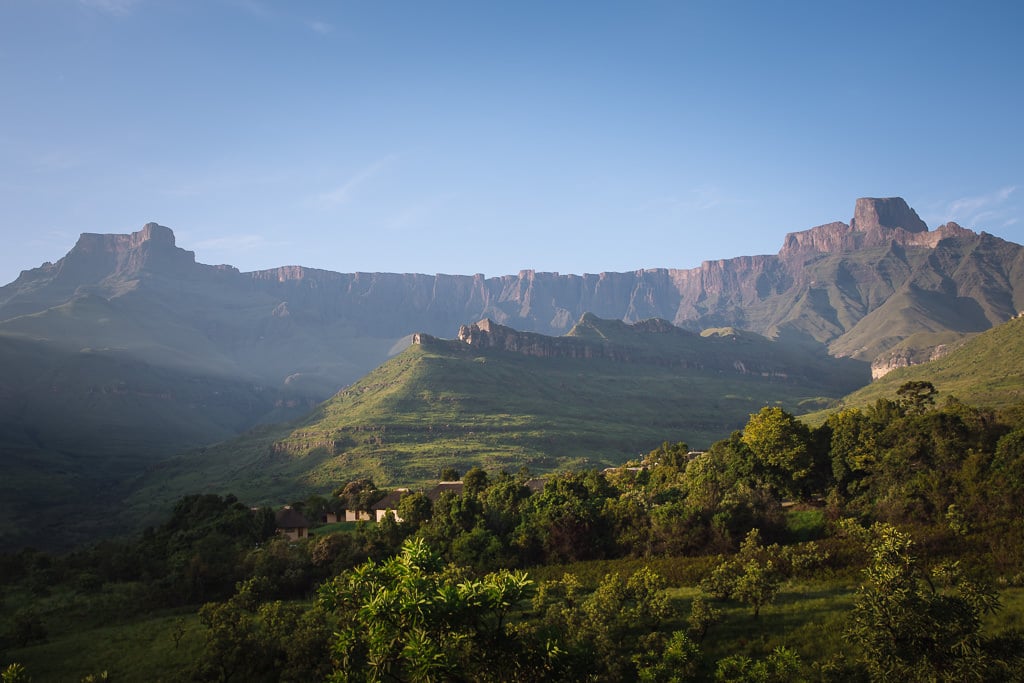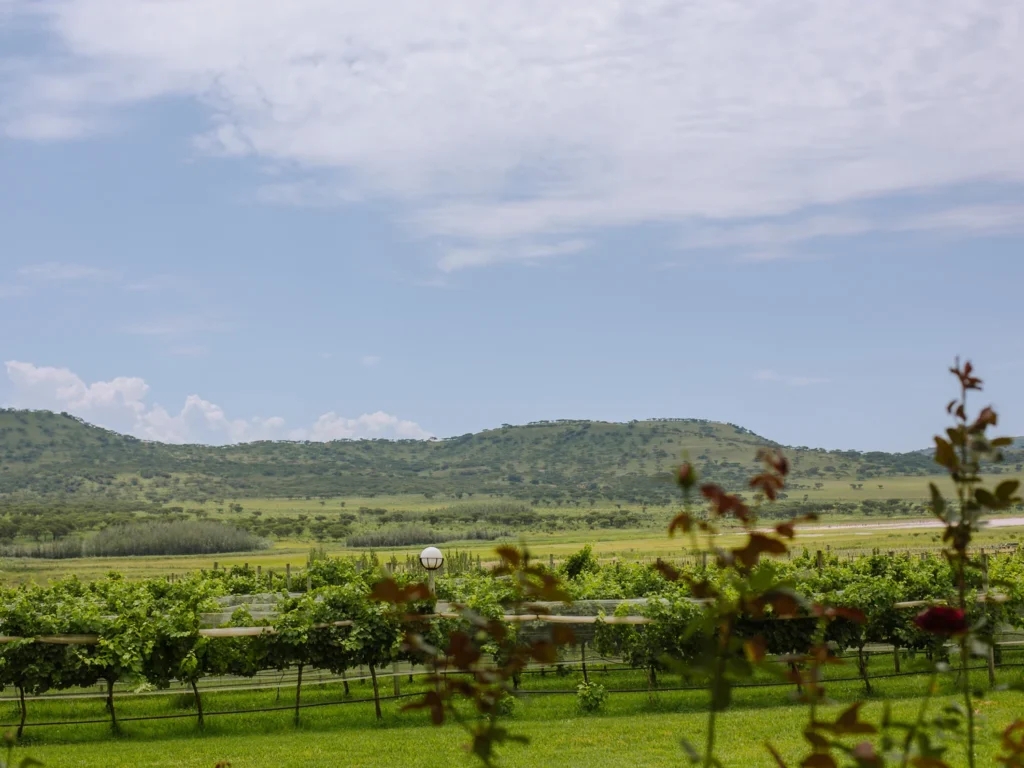Chat to Lesotho shepherds or scale nerve-testing chain ladders; peer over towering waterfalls or stare up at iconic cliff faces; here are our favourite things to do in the Drakensberg Mountains.
By: Paul Healy | Last Updated: | Jump to Comments
From the Sani Pass Mountain lodge deck, valleys stretch out from our 3,000-metre vantage point.
The ice-cold beer, served with typical Lesotho-friendly service, washes away the stress of one of the most adventurous drives we’ve ever done. The view is stunning.
It’s just one of the many incredible things to do in one of the most exciting places to visit in South Africa.
The Drakensberg Mountains form a dramatic natural border between Lesotho and South Africa. They are packed with a wealth of natural phenomena, including a 5-kilometre-long cliff face and the second-highest waterfall in the world.
It’s a beautiful place to visit that feels off-grid and packed with interesting adventures.
Here are a few great things to do in the Drakensberg Mountains.

MAP: DRAKENSBERG MOUNTAINS
We have included our list of the best things to do in the Drakensberg Mountains on the map below to help you find all the main attractions dotted along this rugged mountain range.
HOW TO GET THERE?
The Drakensberg Mountains are a remote region on the South African / Lesotho border.
The closest airports are King Shaka International Airport in Durban (3 hours, 30-minute drive) and Oliver Tambo International Airport in Johannesburg (4 hours, 30-minute drive).
Public transport is very limited in this part of South Africa, so the best option is to hire your own car.
This will also give you the flexibility to see more of the area on your trip. Check prices here:
WHAT TO DO IN THE DRAKENSBERG MOUNTAINS
1. DRIVE THE SANI PASS TO LESOTHO
There are not many drives like this. The Sani Pass rises 1300 metres in less than 9 kilometres as it climbs from the plains of South Africa to the mountain kingdom of Lesotho.
The authorities won’t let you up without a 4×4 and for good reason.
This narrow rocky road has loose boulders, small valleys carved by rain, hairpins that require 3 turns and vertical drops on one side.
The nerve-jangling ascent takes about 1 hour and 15 minutes, but at the top, the views over the Drakensberg Mountains from the highest pub in Africa are magnificent. Tours are available if you don’t fancy the drive.
The details are in our guide to driving the Sani Pass.


2. ADMIRE THE DRAKENSBERG AMPHITHEATRE
The Drakensberg Amphitheatre is 5 kilometres long with a vertical drop of just over 1,200 metres, giving it a cliff face more than 10 times the size of El Capitan in Yosemite.
It’s an awe-inspiring spectacle from above on the Tugela Falls Hike or below on the Tugela Gorge Hike.
The best place to stay to see this natural phenomenon is Thendele Camp in the Royal Natal National Park. From the balcony at the back of their chalets, you can sit back, relax, grab a coffee at dawn (or a beer in the evening), and watch the magically changing light on its rock face.


3. HIKE TO THE TUGELA FALLS
Tucked into the Drakensberg Mountains, the Tugela Falls plunge almost 1,000 metres, making them the second-highest falls in the world.
But, in spite of their height, they’re not the easiest to see.
In winter (when it is dry), they often have no water at all. In summer, their beauty is only revealed after a long hike to get to them.
You can look down on the elegant cascade from the Sentinel Peak Hike, which winds its way up the side of the Drakensberg Amphitheatre. Or you can clamber through the Tugela Gorge, catching a glimpse from a jungle-shrouded distance. Both are an excellent day out.



4. SCALE NERVE-TESTING CHAIN LADDERS
The Drakensberg Mountains have numerous vertical rock walls, providing dramatic scenery and interesting challenges.
If you are going to make good progress along the well-marked walking trails, then these sheer cliff faces need to be climbed.
The South African solution is chain ladders – metal ladders that hang vertically over the cliff face.
There are a few dotted about the northern Drakensberg, but the highest and most challenging is nearly 100 steps of vertigo-inducing drama on the Tugela Falls Hike. This is the hike that goes to the top of the falls; the one that goes to the bottom is the Tugela Gorge hike mentioned above.
If you fancy a challenge of mind over matter and a massive sense of satisfaction, then this is for you.

5. CHAT TO THE LESOTHO SHEPHERDS
The plateau at the top of the Drakensberg Mountains is a different world from that at the bottom.
Instead of fast-growing South African towns, small Lesotho communities live a rural way of life.
Here, Basotho (Lesotho’s citizens) roam the high mountain grasslands looking after their goats, sheep and horses. Dressed like Jedi in sweeping robes and hoods – eyes obscured from the harsh Lesotho sun – they often approached, curious as to why we were on their land.
“Going for a walk” seemed like a strange response to them. But a quick, friendly chat in broken English is an insight into a simple, undiscovered culture.

6. CLIMB THE 3,000-METRE CATHEDRAL PEAK
Getting from the bottom of the Drakensberg Mountains to the top is not easy.
The sheer-sided cliff face makes most hiking routes impossible. But this sensational hike to the summit of 3,004m Cathedral Peak can be done as a walk.
Just not an easy one.
Considered ‘non-technical’ the return day trip is 19 kilometres, ascends 1600 metres and takes 9 to 10 hours.
However, it’s not just the length that is tricky; the final section up to the summit is a challenging scramble on exposed edges using fixed aids.
The rewards are magnificent views and immense self-satisfaction. First-timers should take a guide.
Our guide to visiting Cathedral Peak has more information about this area.

7. BOULDER HOP UP SHEER-SIDED GORGES
You can swim in the rivers and pools, boulder hop along the stream bed, or simply stare up at the vertical walls in several of the dramatic gorges in the Drakensberg Mountains.
As you head upstream, they get tighter, steeper, and more challenging, adding to your already strong sense of adventure.
Rainbow Gorge in Cathedral Peak and Tugela Gorge in Royal Natal National Park are two of the best.
But make sure you check the weather conditions before you depart; heavy downpours are a regular afternoon occurrence.

8. VISIT THE CATHEDRAL PEAK WINE ESTATE
When you have had enough of adventure, or rain is on its way, then the Cathedral Peak Wine Estate is the perfect place for lunch.
Out of respect for the region where the winery is based, their finest wines are named UNESCO 985 – the identification number for the Drakensberg successful UNESCO application in 2000.
Wine tasting is R10 (€0.50 / $0.56 / £0.45) per glass and can be accompanied by their tasty meat and cheese platter.
Try the full-bodied Merlot in the Estate Range or the uniquely South African Pinotage and while away the afternoon looking out over the vineyards backed by the impressive Drakensberg mountains.


9. EXPLORE MILLENNIA OLD SAN ROCK ART
San (or Bushmen), South Africa’s original people, inhabited the Drakensberg Mountains for thousands of years before practically disappearing in the late 1800s.
Fortunately, they left behind a fragile legacy: stone-age rock art.
There are over 600 rock art sites and tens of thousands of paintings spread across the region, but the finest can be found at Games Pass Shelter near Kamberg, Main Caves near Giants Castle Camp or Battle Cave near Injisuthi.
The Didima Rock Art Centre in Royal Natal National Park also has an informative museum dedicated to the rise and fall of the San and their art.

10. RAMBLE THE 60-KILOMETRE GIANT’S CUP TRAIL
If scaling chain ladders, boulder-hopping, and steep climbs sound too much, consider this excellent multi-day hike, which is widely considered the best long-distance walk in the Drakensberg.
It takes 5 days and covers 60 kilometres. Although it’s long, it’s only moderately difficult.
It starts at the bottom of Sani Pass and winds its way along streams and valleys through the Drakensberg’s dramatic, rugged scenery to Bushman’s Nek.
It is the only hutted hike in the Drakensberg. As the accommodation is basic, you’ll need to provide your own bedding and food.
It’s cold showers all the way.

BEST TIME TO VISIT THE DRAKENSBERG MOUNTAINS
The best time to visit the Drakensberg Mountains is from March to May when the rains have subsided, the temperatures are comfortable, and the hills are still lush green from the winter downpours.
September to November are also good for walking, but the hills will be a parched brown rather than a glittering green.
Summer rains (December through February) can be torrential in the Drakensberg, and temperatures can reach into the mid-30s, making activities tiring.
In winter (June to August), the temperatures drop rapidly, and the higher altitudes can be very cold making.
Whatever time of year you go, try to start early each day. The early morning has the best light for photos, the clearest skies and less strong winds.
In summer, make sure you are back by early afternoon. Torrential thunderstorms can appear from nowhere, making conditions not only uncomfortable but the gorges outright dangerous.

TIPS FOR FIRST-TIME VISITORS TO THE DRAKENSBERG MOUNTAINS
Split into a number of different areas, getting around the Drakensberg takes time. Public transport is almost non-existent, so we suggest you hire a car for your visit.
If you are using public transport, stay on the edge of the park and join daily tours.
Because of its size, you will probably need to choose which areas you want to visit.
If you are coming for the first time, we highly recommend the Royal Natal National Park in the northern Drakensberg. Here, you can see the Drakensberg Amphitheatre, hike to the Tugela Falls, climb chain ladders, boulder hop up gorges and meet Basotho locals.
If you have a bit more time, take the exciting but tortuous drive up the Sani Pass.
Not only is the drive great, but at the top, you’ll find the highest pub in Africa, friendly locals, stunning views and some superb hiking. For more information, read our 4×4 adventure up the Sani Pass post.
To time your visit perfectly, read our article on the best times to visit South Africa.

MORE SOUTH AFRICA GUIDES
- Plan your trip with our detailed Cape Town itinerary.
- Here are all our favourite places to visit in South Africa.
- Planning a trip? Read our 3-week South Africa Itinerary.
- Read our tips for planning your South Africa trip.
- These are the best things to do in Cape Town – food, attractions, hikes & more.
- How to do a self-drive Kruger Safari.
- Here’s why you should add the Drakensberg to your South Africa Trip.
- When to go? Read our guide on the best time to visit South Africa.

READER-SUPPORTED
When you buy through links on our site, we may earn a small affiliate commission at no extra cost to you.
Thanks for your support. Paul & Mark


Hiking in the bergs
It’s pretty good.
So beautiful places to be
So nice